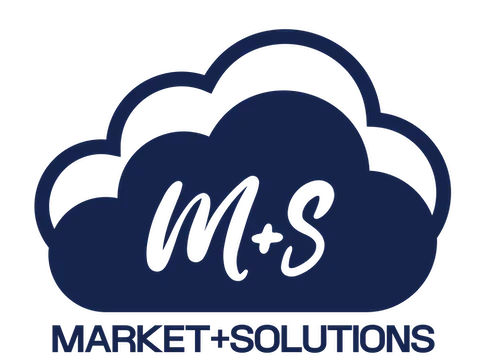Content Strategy for SaaS: The Growth Engine You Can’t Ignore
Is content strategy really that important for small SaaS businesses?
Absolutely—now more than ever.
While every industry needs a tailored digital marketing approach, SaaS companies thrive on a strong content strategy. It’s not just another marketing activity—it’s the backbone of sustainable growth and long-term customer retention.
Why Is a Content Strategy So Crucial for SaaS?
Because it does more than fill your blog.
An effective SaaS content strategy builds awareness, positions your brand as a trusted expert, and drives high-quality organic traffic. It guides prospects smoothly through the sales funnel—educating them at the awareness stage, building trust during consideration, and supporting conversions at the decision stage. And it doesn’t stop there.
A smart content strategy strengthens customer relationships post-sale, increasing retention and turning happy users into vocal advocates. It’s not just about visibility; it’s about long-term value.
When executed right, your content strategy delivers the right insights at the right time—whether it’s through SEO-driven blog posts, in-depth guides, or product-focused thought leadership. From top to bottom of the funnel, it works to attract, convert, and retain the customers who matter most.
In short: for SaaS, a great content strategy isn’t optional. It’s the growth engine behind every successful brand.
Latest SaaS Content Marketing Statistics
What Are Successful SaaS Entrepreneurs Saying About Content Marketing?
The consensus is unmistakable: content marketing is a core driver of growth for SaaS businesses. Key statistics reveal why this strategy is essential and just how impactful it can be in driving success:
- 74% of companies report that content marketing significantly boosts lead generation.
- Content marketing is 62% more cost-effective to launch and maintain than traditional tactics.
- 59% of marketers consider high-quality content the top strategy for SEO.
- 92% of marketers believe content is critical for long-term ROI.
- Content marketing can increase conversion rates by up to 6x.
- 62% of businesses identify content marketing as offering the highest ROI.
These statistics make it clear: companies that invest in content marketing experience measurable gains and a substantial ROI. This isn’t just hearsay—the data underscores that a well-crafted content strategy can mean the difference between simply surviving and truly thriving in today’s competitive SaaS landscape.
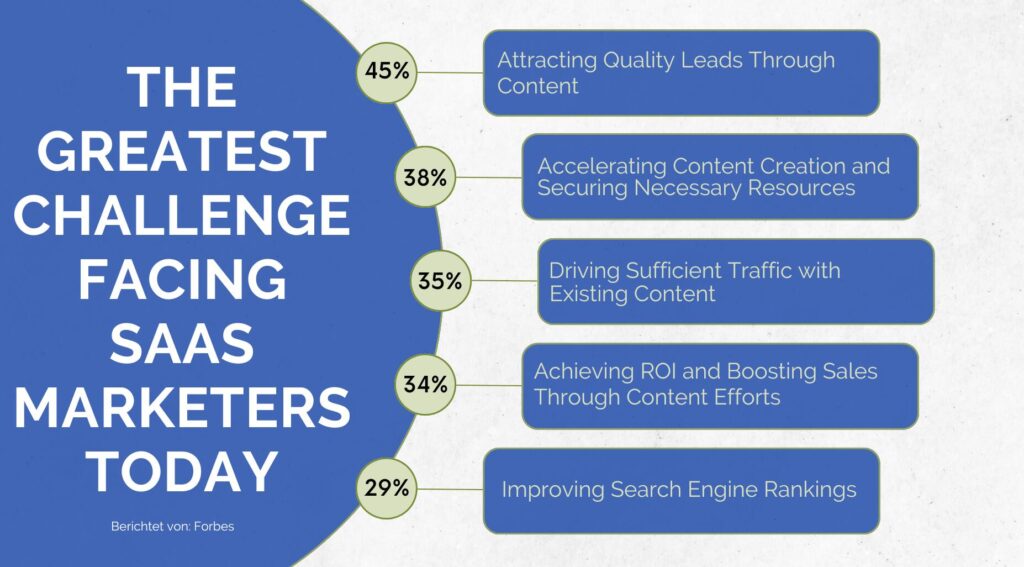
The Benefits of Content Marketing for SaaS
Why Invest in Content Marketing for Your SaaS Business? If scaling your SaaS business is a priority, here are five essential reasons why content marketing should be at the core of your strategy.
Building Brand Awareness
SaaS solutions are often specialized, making it essential to clearly communicate your unique value. Content marketing raises awareness by educating potential customers about your software, highlighting its benefits, and addressing specific pain points. According to Forbes, 84% of B2B companies achieve brand recognition through content marketing, making it a powerful first step in building your brand.
Establishing Industry Leadership
With content marketing, SaaS companies can position themselves as industry experts. Consistently publishing high-quality, insightful content builds credibility and trust among prospects. Thought leadership content, like industry analysis, case studies, and expert insights, sets your SaaS solution apart and establishes your brand as a trusted resource for industry knowledge.
Driving Organic Traffic
Visibility is everything. A strong content marketing strategy, driven by precise SEO, significantly boosts your company’s presence in search results. Targeting the right keywords brings high-quality, organic traffic—visitors who are actively searching for solutions like yours. This means more engagement and conversions from an audience already aligned with what your SaaS offers.
Nurturing Leads Through the Funnel
Content marketing is essential for guiding prospects from awareness to decision. By providing tailored content at each stage of the journey, you address specific needs precisely when they arise. This not only moves leads closer to conversion but builds a foundation of trust, positioning your SaaS solution as the reliable choice.
Supporting Customer Retention
Content marketing doesn’t end once a lead becomes a customer. SaaS companies can use content to educate users on maximizing the software’s value, solving common challenges, and discovering new features. This approach not only aids retention but also transforms satisfied customers into advocates who drive referrals, expanding your reach organically.
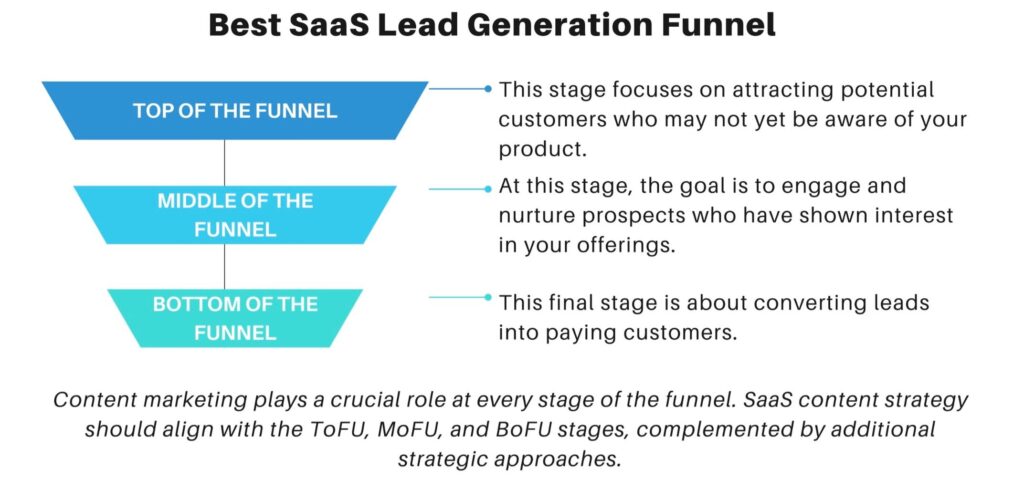
Best Content Strategy for Small SaaS Businesses
A successful content strategy for SaaS isn’t just about creating content; it’s about guiding potential customers seamlessly through each stage of the buyer’s journey—from awareness to conversion. By tailoring your content for every phase of the funnel—Top of Funnel (ToFU), Middle of Funnel (MoFU), and Bottom of Funnel (BoFU)—you engage leads precisely where they are, turning prospects into loyal customers and driving long-term growth.
Top of the Funnel (ToFU): Content Strategy for SaaS
Objective: At the ToFU stage, your primary goal is brand awareness. This is where you capture attention by educating potential customers and helping them recognize challenges your SaaS solution can address.
Strategy: For ToFU, create high-value, shareable content that’s easily discoverable through search engines and social media. The focus is on delivering informative, engaging content without pushing a hard sale.
Essential SaaS Content Types:
- Blogging: Regularly publishing insightful blog posts on industry trends and common challenges attracts a diverse audience. This positions your brand as a thought leader while building awareness.
- Infographics: Use infographics to simplify complex data and industry insights into visual content. Infographics are easily shareable, increasing the reach of your message.
- Explainer Videos: These concise videos introduce your SaaS product, showcasing its benefits in a way that grabs attention and generates interest at the top of the funnel.
Middle of the Funnel (MoFU): Content Strategy for SaaS
Objective: At MoFU, leads are actively evaluating options. Your goal here is to nurture these leads with content that demonstrates how your SaaS solution directly addresses their needs.
Strategy: The MoFU strategy focuses on delivering in-depth, solution-oriented content, often gated, to encourage deeper engagement while helping you qualify leads.
Essential SaaS Content Types:
- Ebooks and Whitepapers: These long-form pieces provide valuable insights into industry challenges your product addresses. Gated content like this not only educates leads but also helps capture their information for further nurturing.
- Webinars: Hosting webinars on specific challenges or showing practical applications of your SaaS builds authority and trust. The interactive format helps foster stronger connections with potential leads.
- Case Studies: Real-world examples of your SaaS solution in action help potential customers see how it delivers results. Case studies highlight tangible benefits and successful outcomes, easing the decision-making process.
Bottom of the Funnel (BoFU): Content Strategy for SaaS
Objective: At BoFU, leads are close to making a purchase. The focus is on conversion, with content that addresses final objections and showcases the product’s value.
Strategy: BoFU content should be direct, persuasive, and geared toward closing the sale. Clear calls to action, such as scheduling a demo or signing up for a free trial, are essential to help leads take the final step.
Essential SaaS Content Types:
- Product Demos: Live or recorded demos give potential customers a firsthand look at how your SaaS solution addresses their needs. Seeing the product in action can make the decision to purchase much easier.
- Free Trials: Offering a free trial allows leads to experience your product’s value firsthand, often serving as the final nudge to convert them into paying customers.
- Comparison Guides: Help customers understand how your SaaS stacks up against competitors. Comparison guides should highlight your product’s unique strengths to address any remaining hesitations.
- Customer Testimonials and Reviews: Positive feedback from real users provides the social proof needed to reassure potential customers. Testimonials can address lingering concerns and build confidence in their purchasing decision.
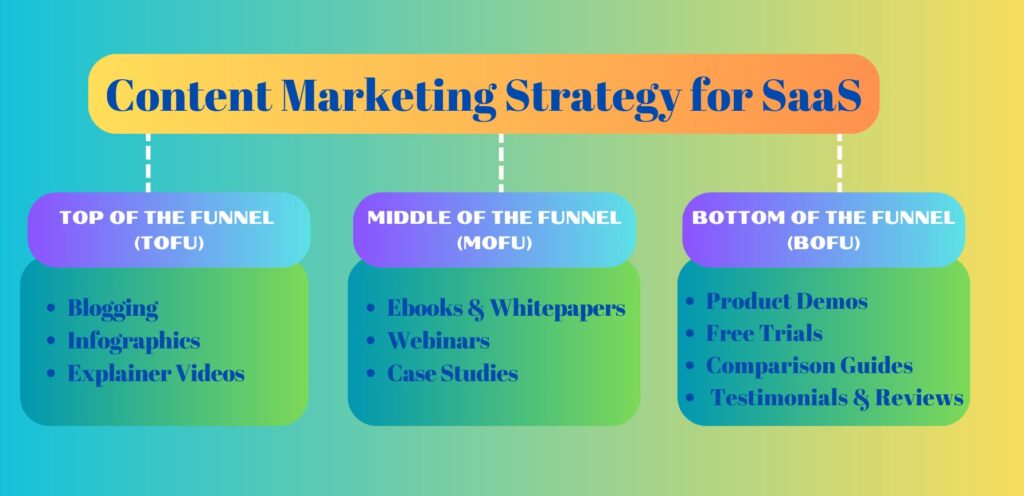
SaaS Content Marketing Channels and Formats
Reports consistently show that SaaS companies reap substantial benefits from content marketing. According to a recent Forbes report, the top-performing channels and formats for SaaS content marketing include:
Top Content Marketing Channels for SaaS:
- In-Person Events (56%)
- Webinars (51%)
- Email (44%)
- Organic Social Media (44%)
- Blogs (40%)
- Email Newsletters (39%)
Top Content Marketing Formats for SaaS:
- Short Articles and Posts (94%)
- Educational Videos (84%)
- Long Articles (71%)
- Visual Content (60%)
- E-books and White Papers (59%)
- Brochures and Product Data Sheets (49% and 45%)
- Interactive Content (33%)
- Live Streaming (25%)
Conclusion
Content marketing is the cornerstone of growth and sustained success for SaaS companies. A carefully crafted content strategy helps build brand awareness, establish industry leadership, and guide prospects through each stage of the buyer’s journey. From top-of-funnel attraction to bottom-of-funnel conversion, strategic content marketing transforms prospects into loyal customers and brand advocates. In the competitive SaaS landscape, content marketing, powered by a robust strategy, is the engine that drives growth forward.
